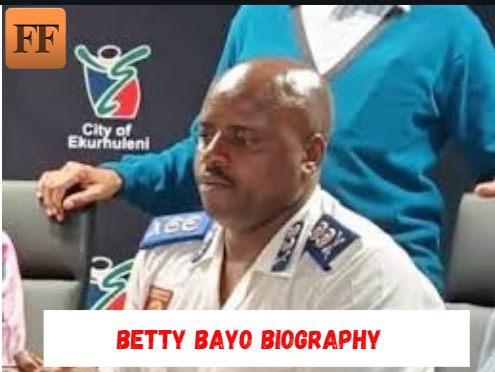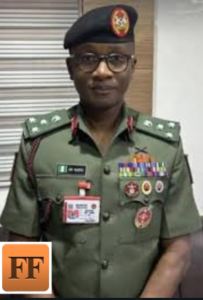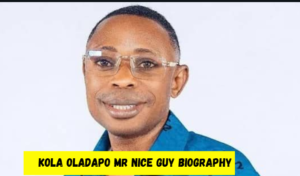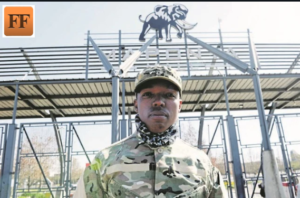
Behind every uniform is a story — a path marked by ambition, choices, and moments that shape a person’s destiny. One such story belongs to Brigadier Julius Mkhwanazi, a senior figure in South Africa’s municipal policing system. Known for his years of service in the Ekurhuleni Metropolitan Police Department (EMPD), Mkhwanazi’s career has been a blend of commitment, leadership, and controversy.
This detailed Julius Mkhwanazi biography explores his early life, career growth, educational background, and family — shedding light on how one man rose from humble beginnings in KwaZulu-Natal to become one of EMPD’s most recognized names.
Julius Mkhwanazi Biography
| Attribute | Details |
|---|---|
| Full Name | Julius Mkhwanazi |
| Date of Birth | February 5, 1973 |
| Age (as of 2025) | 52 years old |
| Birthplace | KwaZulu-Natal, South Africa |
| Occupation | Police Officer / Deputy Municipal Commissioner |
| Institution | Ekurhuleni Metropolitan Police Department (EMPD) |
| Education | University of South Africa (UNISA) |
| Marital Status | Married |
| Wife | Esethu Mkhwanazi |
| Children | Three |
| Nationality | South African |
Early Life and Background
Born on February 5, 1973, in KwaZulu-Natal, South Africa, Julius Mkhwanazi grew up in a community where public service and discipline were deeply respected. His early years were shaped by exposure to local policing structures and a curiosity about how law and order functioned at a grassroots level.
Growing up during South Africa’s transitional years toward democracy, he witnessed firsthand how law enforcement could play both a protective and divisive role in society. That experience likely inspired his commitment to pursuing a career that would balance authority with fairness.
Education and Qualifications
Education was a central pillar in Mkhwanazi’s development. He studied at the University of South Africa (UNISA), a respected institution known for producing some of the country’s top public administrators and law enforcement professionals.
At UNISA, Mkhwanazi focused on public administration, policing studies, and leadership management, which provided him with a strong academic foundation for his later work in municipal operations. His combination of formal education and field experience helped him navigate the complex administrative and ethical demands of senior policing roles.
Entry into Policing
Like many officers, Julius Mkhwanazi started his journey with modest responsibilities. His early days in municipal policing involved community patrols, enforcing bylaws, and ensuring public safety during major city events.
His sharp sense of duty and ability to remain composed under pressure earned him the respect of colleagues. Over time, he was promoted into more specialized areas of enforcement — setting the stage for a long and eventful career.
Rise through the Ranks
Mkhwanazi’s ascent through the Ekurhuleni Metropolitan Police Department (EMPD) was gradual but steady. From operational posts, he moved into leadership and strategic management, eventually becoming Deputy Municipal Commissioner for Operations and Specialized Services.
This position placed him among the top officers in EMPD, responsible for decisions that affected hundreds of employees and millions of city residents. It also meant that every action — from personnel promotions to procurement — carried significant weight.
Role in the Ekurhuleni Metropolitan Police Department (EMPD)
At EMPD, Mkhwanazi oversaw operations, specialized units, and citywide deployments. His tasks often involved managing major civic events, coordinating between law enforcement divisions, and ensuring that public order was maintained.
He was occasionally appointed as acting head of the department during the absence or suspension of senior commissioners — a sign of institutional trust in his leadership abilities.
However, with great responsibility comes great scrutiny. Some of the decisions made under his acting leadership later became subjects of review, bringing both his strengths and challenges into public view.
Leadership Style and Reputation
Colleagues have described Julius Mkhwanazi as a decisive and hands-on leader. He was known to step in quickly when operational challenges arose, often bridging gaps between departments and restoring order during turbulent periods.
But that same urgency — while effective in the short term — sometimes led to criticism. Some observers noted that speedy decision-making without full procedural backing could invite questions about transparency. Nonetheless, his reputation as a problem-solver and strategic thinker remained solid within many circles of municipal governance.
Involvement in Public Inquiries
Every public official faces moments of accountability, and for Mkhwanazi, one of those came through his involvement in inquiries examining law enforcement practices. As one of EMPD’s senior figures, his testimony and administrative records became important sources of evidence for understanding how decisions were made within the department.
His engagement with such inquiries showcased not only his position of authority but also the complexities that senior officers face when navigating between policy, politics, and ethical responsibility.
The Madlanga Commission and Public Attention
In 2025, the Madlanga Commission of Inquiry brought Mkhwanazi’s name into wider public discussion. The commission, which examined allegations of political interference and irregularities in various law enforcement agencies, included references to EMPD leadership decisions during his tenure.
While not personally accused of wrongdoing, Mkhwanazi’s role as a senior decision-maker placed him in the center of debate about transparency and governance. The episode drew mixed public reactions — some viewing him as a dedicated official caught in a larger political storm, while others sought clearer accountability from all senior officers involved.
Family Life and Wife
Behind the professional headlines, Julius Mkhwanazi is also a family man. He is married to Esethu Mkhwanazi, and together they have three children. Despite his public career, he has managed to keep his private life low-profile, maintaining a clear boundary between home and work.
His wife, Esethu, has been described by acquaintances as supportive yet private, preferring to stay away from public attention. Their marriage reflects the balance between career ambition and personal grounding, something often difficult to maintain in demanding law enforcement roles.
Challenges and Controversies
Leadership inevitably brings challenges. In Mkhwanazi’s case, scrutiny arose over procurement decisions and staff appointments made under his oversight. Critics questioned whether proper procedures were always followed, while supporters argued that his actions were intended to keep the department functional during administrative delays.
The broader debate pointed to a recurring issue in many public institutions — how to balance urgency with process, and efficiency with ethics. Mkhwanazi’s experience offers a vivid example of how internal decisions can escalate into public discussions about governance.
Achievements and Contributions
Throughout his career, Brigadier Julius Mkhwanazi contributed significantly to municipal policing, operational management, and crisis coordination. His leadership during citywide events, community operations, and internal reforms left a mark on EMPD’s structure.
He was instrumental in implementing specialized units designed to tackle urban challenges like traffic enforcement, bylaw compliance, and crime prevention. His ability to manage large-scale deployments demonstrated his strong command skills and logistical understanding.
Lessons from His Journey
Mkhwanazi’s story carries several lessons — both for law enforcement professionals and for citizens observing the workings of public service. His journey illustrates the tension between leadership authority and procedural accountability.
Like a captain steering a ship through stormy seas, he had to make quick calls, sometimes without the full calm of consensus. Whether praised or criticized, those decisions define what it means to lead under pressure.
Age and Personal Outlook
As of 2025, Julius Mkhwanazi is 52 years old. With decades of policing experience behind him, he represents a generation of officers who have witnessed South Africa’s law enforcement system evolve in real time.
At this stage in his career, his outlook reportedly focuses on institutional reform and mentorship, helping shape younger officers into professionals who uphold integrity and community trust.
Legacy in South African Policing
Regardless of public controversies, Mkhwanazi’s legacy lies in his long-standing service and influence within municipal law enforcement. His tenure at EMPD underscores the importance of transparent leadership and institutional oversight in maintaining public confidence.
Future discussions about policing reforms may well draw on experiences from figures like him — individuals who have navigated both the achievements and pitfalls of public service at the city level.
Conclusion and Reflections
In the end, the Julius Mkhwanazi biography reflects more than just one man’s career — it highlights the complexities of leadership within modern policing. From KwaZulu-Natal beginnings to senior municipal command, his journey is a blend of discipline, ambition, and the ever-present test of public accountability.
While debates continue about certain aspects of his tenure, one thing remains clear: Julius Mkhwanazi’s story is a reminder that every leader walks a fine line between service and scrutiny, and that the measure of one’s career often depends on how they respond when both collide.
Frequently Asked Questions (FAQs)
1. Who is Julius Mkhwanazi?
Julius Mkhwanazi is a South African police officer who serves as Deputy Municipal Commissioner for Operations and Specialized Services at the Ekurhuleni Metropolitan Police Department (EMPD).
2. How old is Julius Mkhwanazi?
As of 2025, Julius Mkhwanazi is 52 years old, having been born on February 5, 1973.
3. Is Julius Mkhwanazi married?
Yes, he is married to Esethu Mkhwanazi, and the couple has three children. He keeps his family life private and away from media attention.
4. What are Julius Mkhwanazi’s qualifications?
He studied at the University of South Africa (UNISA), where he obtained qualifications in public administration and policing management — crucial for his senior roles in law enforcement.
5. What is Julius Mkhwanazi known for?
He is best known for his leadership within the EMPD, his involvement in operational planning, and his testimony during the Madlanga Commission of Inquiry in 2025.
The Julius Mkhwanazi biography offers a nuanced look at a man balancing service, scrutiny, and leadership in a demanding public institution. His story continues to evolve — a living chapter in South Africa’s ongoing pursuit of integrity within law enforcement.





